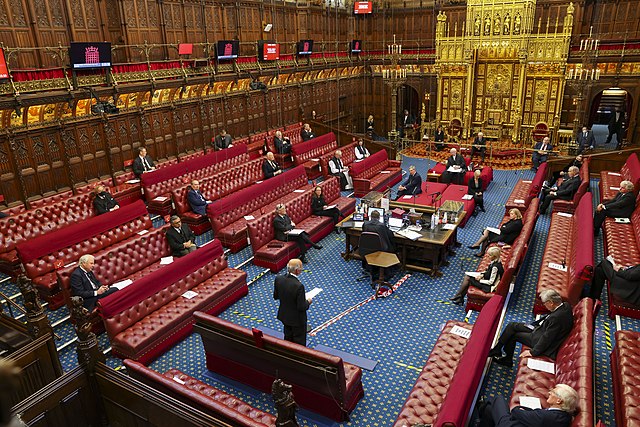Secondary Legislation Scrutiny Committee says HC 1298 exemplifies wider shortcomings in immigration policymaking
In a report released yesterday, the House of Lords Secondary Legislation Scrutiny Committee has drawn Parliament's special attention to September's statement of changes to the Immigration Rules (HC 1298) and the Government's suspension of the refugee family reunion (RFR) visa route. The Committee expressed concern over the policy's evidence base, transparency, and clarity about whether the suspension is temporary or permanent.
 Image credit: WikipediaYou can read the report online here or download the PDF version here.
Image credit: WikipediaYou can read the report online here or download the PDF version here.
September's statement of changes halted new visa applications under the RFR route with immediate effect. The route had allowed refugees in the UK to bring their partners and dependant children to join them without fees or financial conditions. Refugees wishing to bring family members to the UK now need to apply under Appendix FM of the Immigration Rules and meet its requirements, such as financial and English language, and either pay the required fee or secure a fee waiver.
According to the Home Office, the suspension aims to reduce pressure on public services, particularly housing, amid rising numbers of arrivals under the RFR route. In the year to June 2025, 20,817 visas were granted, a 30% increase on the previous year. The Government cited a "record" volume of applications and escalating costs for local authorities, which spent over £1 billion on temporary accommodation in 2023–24.
In its report, the Secondary Legislation Scrutiny Committee criticised the lack of supporting data and analysis accompanying the suspension. It noted that the Home Office had provided no estimates of how the suspension might affect migration flows or public service demand, calling this "surprising" and indicative of a wider problem with policymaking that "reacts to events, rather than proceeding from rigorous analysis and supported by evidence."
A submission to the Committee from the Immigration Law Practitioners' Association raised concerns that the suspension could lead to more people attempting to reach the UK by irregular routes. The Committee said that the Home Office's response to this point – that it would "not engage in speculation" – was not "wholly convincing" and urged the department to monitor and report on the impacts during the suspension period.
Noting that an internal Home Office equality impact assessment found the suspension would disproportionately affect women and children, the Committee urged the department to publish the full assessment, which the Home Office had declined to do when asked.
The Committee also highlighted inconsistencies between Government statements about the duration of the suspension. The Home Office had initially described the measure as temporary and said the RFR route would reopen in spring 2026, but a later press release from the Prime Minister on 2 October stated that automatic family reunion rights for refugees "will" end. While the Home Office argued that the two statements were consistent, the Committee disagreed.
The Secondary Legislation Scrutiny Committee stated: "We struggle to accept this argument. Our reading of the first statement is that the RFR route will reopen—both because that is what the wording, taken at face value, appears to say, and because otherwise it would make no sense for applicants to defer their applications. However, the second statement clearly says that automatic family reunion rights will end. It thus appears to us that there has been a change in the policy stance since the Statement was laid before Parliament. The House may wish to press the Minister on the contradiction between, on the one hand, the [Explanatory Memorandum] and the Home Office's responses to us, and, on the other, the Prime Minister's press release of 2 October: is the withdrawal of the fee-free and unconditional route for refugee family reunion temporary or permanent?"
Further concern was expressed at the lack of consultation with affected groups before the policy was introduced, though the Committee acknowledged the Home Office's explanation that public engagement could have led to a surge in applications. The Committee said future consultation should now take place as part of the wider review, the results of which are due by the end of 2025. It added, however: "[W]e are concerned that the 2 October announcement of the intention to end automatic family reunion rights may mean that the outcome of the review in this area has already been decided without the appropriate policymaking processes taking place."
In concluding, the Committee said September's statement of changes in Immigration Rules exemplified wider shortcomings in immigration policymaking. It stated: "This is yet another example of an immigration policy change where the Home Office has not been able adequately to describe the impact; on this occasion, because it is 'unable to provide a sufficiently robust estimate'. We also found the Home Office's answers to our questions unconvincing in some areas and were surprised by the absence of relevant data. This is regrettable and potentially reflects our earlier concern that Home Office policymaking too frequently reacts to events, rather than proceeding from rigorous analysis and supported by evidence. An apparent change in the policy stance in the short time since the Statement was laid only serves to enhance this perception of immigration policy being made by press release rather than following due process. We intend to explore this issue further in an evidence session with a Home Office minister in the near future.
"The suspension should provide an opportunity for a thorough analysis of the effects of the change, including consultation as appropriate, as part of the wider review of family routes—if the outcome of that review has not been pre-empted. We expect to see much better explanatory material and supporting evidence for any secondary legislation arising from the review, notwithstanding the short timeframe in which it is being conducted."